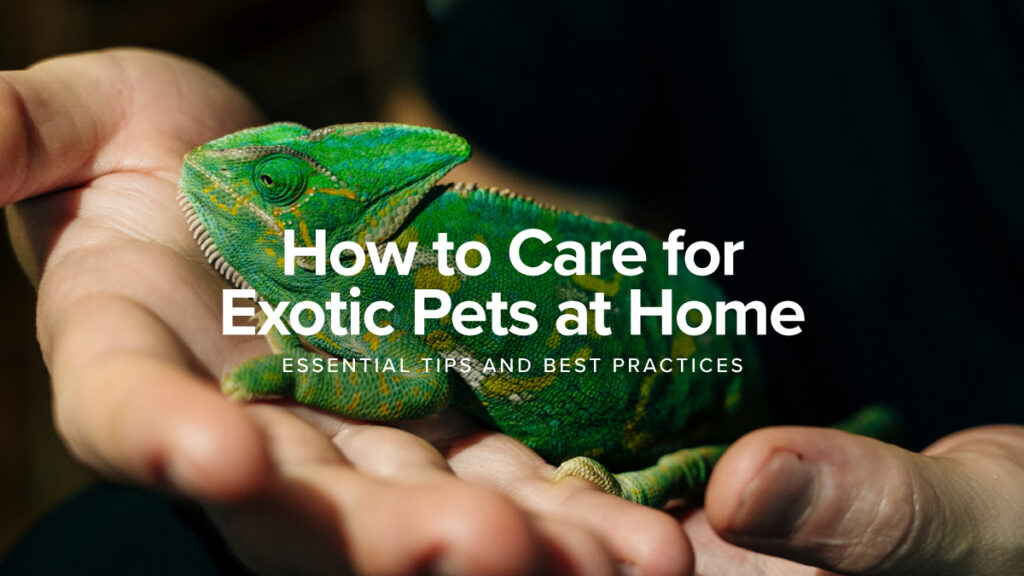When it comes to exotic pets, one of the most critical aspects of how to care for exotic pets at home is replicating their natural habitat as closely as possible. Different species have unique needs, and their environment must cater to their specific requirements to keep them healthy and stress-free.
For reptiles, such as geckos or iguanas, providing a warm and humid enclosure with plenty of hiding spots mimics their natural surroundings. Amphibians like frogs require water features and high humidity, while birds like parrots thrive in spacious cages with plenty of toys for mental stimulation.
Ensuring proper temperature regulation, humidity control, and the right lighting conditions is key to the well-being of many exotic pets. For example, bearded dragons need UVB lighting to synthesize vitamin D3, which is essential for calcium absorption.
According to the American Veterinary Medical Association (AVMA), setting up an appropriate habitat for exotic pets plays a significant role in preventing diseases and stress-related behaviours.
Table of Contents
Diet and Nutrition: Meeting the Needs of Exotic Pets
The dietary needs of exotic pets can vary widely depending on the species. Some exotic pets, such as tortoises, are herbivores and require a diet rich in leafy greens and vegetables. Others, like snakes, are carnivores and may need a diet of whole prey, such as mice or insects.
Inadequate nutrition is one of the leading causes of health issues in exotic pets. To avoid deficiencies, it’s crucial to understand their natural diet and replicate it as closely as possible. Supplements, such as calcium or vitamin powders, may be needed for certain species, especially reptiles.
Fresh water should always be available, and it’s essential to provide a variety of food items to ensure that pets receive all the necessary nutrients. For example, providing different types of fruits, vegetables, and insects can mimic the diverse diet they would have in the wild.
The Association of Exotic Mammal Veterinarians (AEMV) emphasizes the importance of consulting a vet familiar with exotic pets to ensure their diet meets their specific nutritional needs (source: AEMV).
Handling and Interaction: Keeping Your Exotic Pet Happy
Proper handling and interaction can help exotic pets feel safe and secure in a home environment. However, some species may be more sensitive to handling than others. For example, small mammals like hedgehogs may enjoy gentle handling, while reptiles like chameleons can become stressed when over-handled.
When handling exotic pets, it’s essential to approach them calmly and slowly to avoid startling them. Regular interaction helps build trust, but always be aware of their behavior and body language to ensure they are comfortable.
Enrichment is also vital for the mental stimulation of exotic pets. Providing toys, climbing structures, and other forms of entertainment can keep pets engaged and prevent boredom. This is especially important for intelligent animals like parrots, which need constant mental challenges to avoid behavioral issues.
Expert Source: According to the Humane Society, proper handling and enrichment activities are essential for the mental and emotional health of exotic pets, contributing to their overall well-being (source: Humane Society).
Common Health Issues in Exotic Pets
Exotic pets can be prone to a variety of health issues, many of which stem from improper care, diet, or environmental conditions. Some common health problems include:
- Metabolic Bone Disease (MBD) in reptiles due to lack of calcium or improper lighting.
- Respiratory Infections in amphibians and reptiles, often caused by poor humidity levels.
- Feather Plucking in birds, usually a result of stress or boredom.
- Obesity in small mammals due to improper diet and lack of exercise.
Regular veterinary check-ups are essential for detecting and treating these issues early. Exotic pets often hide signs of illness until it becomes severe, so routine health assessments are critical.
The Association of Reptilian and Amphibian Veterinarians (ARAV) recommends annual health checks and emphasizes the importance of early detection in preventing serious health conditions in exotic pets (source: ARAV).
Conservation and Ethical Considerations
While owning exotic pets can be a rewarding experience, it’s essential to consider the ethical implications of keeping wild animals in captivity. Some exotic species are endangered or threatened, and the pet trade can contribute to the decline of wild populations. Ensuring that your pet is sourced from reputable, ethical breeders or adoption agencies is a responsible way to enjoy the company of an exotic pet without contributing to harmful practices.
The World Wildlife Fund (WWF) advocates for responsible pet ownership and stresses the importance of considering the impact on wild populations when choosing to adopt exotic animals.
Creating a Safe and Happy Home for Exotic Pets
By understanding the unique needs of exotic pets, you can provide a safe and enriching environment that mimics their natural habitat. From proper diet and handling to creating a stimulating environment, ensuring the health and happiness of your exotic pet requires commitment and care. With expert advice and dedication, you can enjoy a rewarding relationship with your unique companion.

